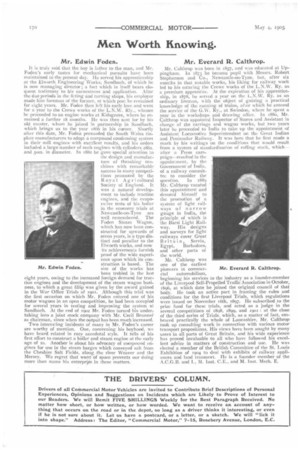Men Worth Knowing.
Page 14

If you've noticed an error in this article please click here to report it so we can fix it.
Mr. Edwin Foden.
It is truly said that the boy is father to the man, and Mr. Foden's early tastes for mechanical pursuits have been maintained to the present day. He served his apprenticeship at the Elworth Engineering Works, Sandbach, of which he is now managing director; a fact which in itself bears eloquent testimony to his earnestness and application. After the due periods in the fitting and turning shops, his employer made him foreman of the former, at which post he remained for eight years. Mr. Foden then left his early love and went for a year to the Crewe works of the L.N.W. Rly., whence he proceeded to an engine works at Kidsgrove, where he remained a further 18 months. He was then sent for by his old master, whom he joined in partnership in Sandhach, which brings us to the year 1866 in his career. Shortly after this date, Mr. Foden persuaded the South Wales tinplate manufacturers to adopt a compound condensing system in their mill engines with exc..:11ent results, and his orders included a large number of such engines with cylinders 28in. and 501n. in diameter. In i882 he gave special attention to the design and manufacture of thrashing machines with remarkable success in many competidons promoted by the Royal Agricultural Society of England. It was a natural development to include traction engines, and the evaporadve tests of his boiler in the economy trials at Newcastle-on-Tyne are welt remembered. The Foden Steam Wagon, which has now been constructed for upwards of seven years, is a type distinct and peculiar to the Eiworth works, and now its achievements furnish proof of the wide experience upon which its construction is based. The size of the works has been trebled in the last eight years, owing to the increased foreign demand for traction engines and the development of the steam wagon business, to which a great fillip was given by the award gained in the War Office Trials of incl. Although this trial was . the first occasion on which Mr. Foden entered one of his motor wagons in an open competition, he had been occupied for several years in testing and improving the system at Sandbach. At the end of 1902 Mr. Foden turned his under: taking into a joint stock company with Mr. Cecil Brunner as chairman, since when the output has been much increased.
Two interesting •incidents of many in Mr. Foden's career are worthy of mention. One, concerning his boyhood, we have heard related in racy anecdotal style. It tells of his first effort to construct a boiler and steam engine at the early age of to. Another is about his advocacy of compound engines for use in the steam barges which conveyed salt from the Cheshire Salt Fields, along, the river Weaver and the Mersey. We regret that want of space prevents our doing more than name his enterpriie in these matters. Mr. Edwin Fader'.
Mr. Everard R. Calthrop.
Mr. Calthrop was born in 1857, and was educated at Uppinghain. In 1873 he became pupil with Messrs. Robert Stephenson and Co., Newcastle-on-Tyne, but, after six months in that notable works, his liking for railway work led to his entering the Crewe works of the L.N.W. Ry. as a premium apprentice. At the expiration of his apprenticeship, in 1878, he served a year on the LX. W. Ry. as an ordinary fireman, with the object of gaining a practical. knowledge of the running of trains, after which he entered the service of the G.V. Ry., at Swindon, where he spent a year in the workshops and drawing office. In ISSo, Mr. Calthrop was appointed Inspector of Stores and Assistant in charge of the carriage and wagon works, but two years later he proceeded to India to take up the appointment of Assistant Locomotive Superintendent on the Great Indian and Peninsular Railway. It was here that he first made a mark by his writings on the conditions that would result from a system of standardisation of rolling stock, which-after a Press campaign—resulted in the appointment, by the Government of India, of a railway committee to consider the question. In /889 Mr. Calthrop vacated this appointment and devoted himself to the promotion of a system of light railways of narrow gauge in India, the principle of which is the Barsi Light Railway. His designs and surveys for light railways cover Great Britain, Servia,
Egypt, Barbadoes, and other parts of the world.
Mr. Calthrop was one of the earliest pioneers in commer cial automobilism, beginning his services to the industry as a founder-member of the Liverpool Self-Propelled Traffic Association in October, 1896, at which date he joined the original council of that body. He took an active part in framing the rules and conditions for the first Liverpool Trials, whic.h regulations were issued on November 16th, 1897. He subscribed to the prize fund for these trials, and acted as a judge in the several competitions of 1898, 1899, and 1901 : at the close of the third series of Trials, which, as a matter of fact, embraced practically the whole of Lancashire, Mr. Calthrop' took up consulting work in connection with various motor transport propositions. His views have been sought by many users in all parts of Great Britain, and his wide experience has proved invaluable to all who have followed hiS excellent advice in matters of construction and use. He was elected a member of the British Committee of the St. Louis Exhibition of 1904 to deal with exhibits of railway appliances and land transport. Ile is a founder member of the A.C.G.B. and I., M. Inst. C.E., and M. Inst. 7k/real. E.
Mr. Everard R. Calthrop.
















